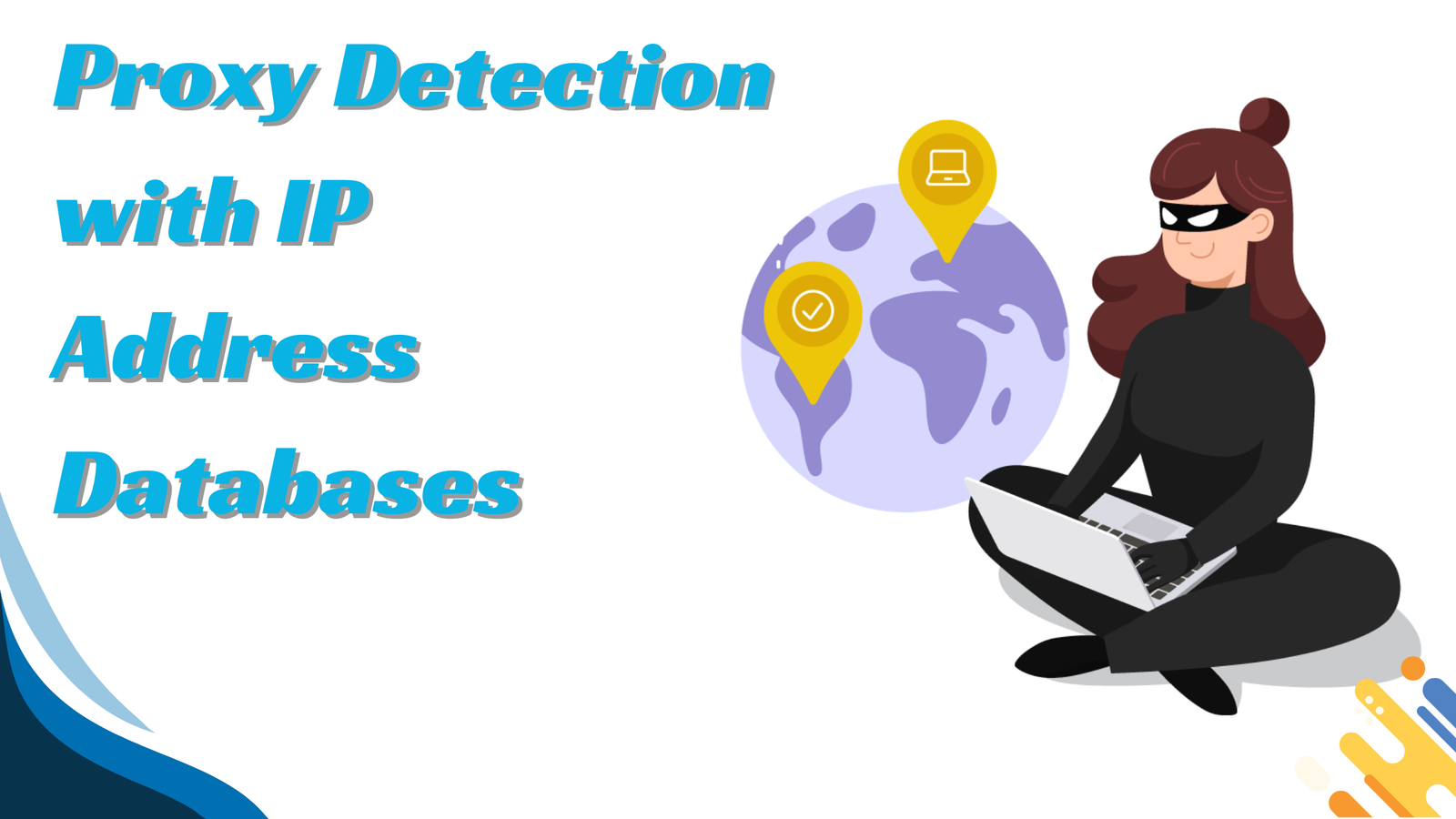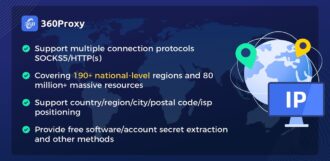Shielding Your Site: Proxy Detection with IP Address Databases
- 1 Understanding Proxy Servers and Their Uses
- 2 How Proxy Detection IP Databases Work
- 2.1 Blocklists and Allowlists:
- 2.2 Behavioural Analysis:
- 2.3 Geolocation Data:
- 2.4 Anonymity Testing:
- 2.5 Machine Learning and AI:
- 2.6 Implementation and Integration:
- 2.7 Challenges and Limitations:
- 3 Benefits of Using Proxy Detection IP Databases
- 3.1 1. Enhanced Security:
- 3.2 2. Fraud Prevention:
- 3.3 3. Access Control:
- 3.4 4. Content Protection:
- 3.5 5. Regulatory Compliance:
- 3.6 6. Improved Performance:
- 3.7 7. Scalability and Flexibility:
- 4 Choosing the Right Proxy Detection Solution
In today’s digital landscape, malicious actors and bots can exploit loopholes to disrupt online activities. Proxy servers and anonymizers add another layer of complexity, allowing users to mask their actual IP addresses. This can pose security risks and skew website traffic data.
Here’s where the proxy detection IP address database comes into play. These databases act as shields, helping identify and potentially block traffic originating from anonymous sources.
Understanding Proxy Servers and Their Uses
Proxy servers act as intermediaries between your device and the internet. Traffic routes through the proxy server first, hiding your actual IP address from the website you visit.
Here are some common reasons users employ proxies:
- Privacy: Users seeking anonymity online might leverage proxies to mask their browsing activity.
- Geo-Restrictions: Proxies can be used to access geo-restricted content by appearing to originate from a different location.
- Security: Some businesses utilize proxies to enhance web security by hiding their server’s IP address.
However, proxy servers can also be misused for:
- Scraping Data: Malicious bots may use proxies to scrape vast amounts of data from websites.
- Brute-Force Attacks: Proxy servers can be used to mask the origin of brute-force login attempts.
- Click Fraud: Fraudulent clicks on advertisements can be generated through proxies.
How Proxy Detection IP Databases Work
Proxy detection IP databases are sophisticated repositories of IP addresses categorized based on their association with proxy servers. These databases employ a combination of techniques to identify and classify proxy IP addresses.
Let’s explore some of the fundamental mechanisms used:
Blocklists and Allowlists:
Proxy detection databases maintain extensive blocklists of known proxy IP addresses associated with malicious activities. These blocklists are continually updated based on intelligence gathered from various sources, including user reports, security researchers, and automated scanning systems.
Conversely, allowlists contain IP addresses known to be legitimate and not associated with proxy servers. These lists help minimize false positives and ensure that legitimate users are not inadvertently blocked.
Behavioural Analysis:
Proxy detection databases analyze IP address behaviour to identify suspicious patterns indicative of proxy usage. For example, a sudden surge in traffic from a particular IP address, frequent IP address changes, or irregular browsing patterns may raise red flags.
Geolocation Data:
Geolocation data plays a crucial role in proxy detection. While not all proxy servers are located in foreign countries, many are used to bypass geo-restrictions. Proxy detection databases leverage geolocation data to flag IP addresses located in known proxy-friendly regions or countries with a high incidence of cybercrime.
Anonymity Testing:
Some proxy detection databases conduct real-time tests to determine IP address anonymity. These tests involve sending requests to the IP address and analyzing the response headers to ascertain whether the IP address is being used as a proxy and to what extent it anonymizes traffic.
Machine Learning and AI:
Advanced proxy detection systems employ machine learning and artificial intelligence algorithms to improve their accuracy and adapt to evolving threats continuously. These algorithms analyze vast amounts of data to identify patterns and anomalies associated with proxy usage, enhancing the effectiveness of detection mechanisms.
Implementation and Integration:
Proxy detection IP databases are typically integrated into various security solutions, including firewalls, intrusion detection systems (IDS), and web application firewalls (WAF). These solutions leverage the intelligence provided by proxy detection databases to block or flag suspicious traffic in real time, thereby enhancing overall cybersecurity posture.
Furthermore, many online services and platforms utilize proxy detection to enforce access controls and prevent abuse. For example, streaming services may use proxy detection to prevent users from accessing content outside of their licensed regions. At the same time, e-commerce platforms may employ it to detect and prevent fraudulent transactions.
Challenges and Limitations:
While proxy detection IP databases are invaluable tools for combating proxy-related threats, they are not without limitations. Some of the challenges associated with proxy detection include:
- False Positives: Overly aggressive proxy detection mechanisms may inadvertently block legitimate users, leading to false positives.
- Evasion Techniques: Malicious actors continuously develop new evasion techniques to bypass proxy detection mechanisms, necessitating constant updates and improvements.
- Dynamic IP Addresses: The dynamic nature of IP addresses makes it challenging to maintain accurate blocklists and allowlists, as IP addresses associated with proxies may change frequently.
These databases employ various techniques to identify proxies, such as:
- IP Range Analysis: Identifying IP blocks known to be used by proxy providers.
- Blocklist Lookups: Checking IP addresses against known proxy blocklists.
- Behavioural Analysis: Monitoring user behaviour patterns to detect suspicious activity.
Benefits of Using Proxy Detection IP Databases
Integrating a proxy detection IP address database into your website security measures offers several advantages:
Let’s delve into the detailed advantages of using proxy detection IP databases:
1. Enhanced Security:
Proxy detection IP databases help organizations identify and block malicious traffic originating from proxy servers. By maintaining up-to-date blocklists of known proxy IP addresses associated with cyber threats, these databases enable organizations to proactively mitigate risks such as hacking, data breaches, and malware infections. By preventing malicious actors from accessing their networks and systems via proxy servers, organizations can significantly enhance their overall security posture.
2. Fraud Prevention:
Fraudsters commonly use proxy servers to anonymize their online activities and perpetrate various types of fraudulent schemes, including account takeovers, identity theft, and payment fraud. Proxy detection IP databases enable organizations to identify and block suspicious transactions originating from proxy IP addresses, thus reducing the incidence of fraud. By flagging and blocking proxy traffic, businesses can protect their financial assets, safeguard customer data, and preserve their reputation.
3. Access Control:
Many organizations rely on geolocation-based access controls to enforce regional restrictions on their online services and content. Proxy detection IP databases provide organizations with accurate geolocation data, allowing them to detect and block attempts to bypass these restrictions using proxy servers. By enforcing access controls based on IP geolocation, organizations can ensure compliance with licensing agreements, prevent unauthorized access to sensitive content, and tailor their services to specific regions or markets.
4. Content Protection:
Content providers, such as streaming platforms and digital publishers, face the challenge of content piracy and unauthorized distribution. Proxy detection IP databases help content providers identify and block attempts to access their content via proxy servers, thereby reducing the risk of piracy and unauthorized distribution. By protecting their intellectual property and revenue streams, content providers can maintain the integrity of their offerings and maximize their profitability.
5. Regulatory Compliance:
Many industries are subject to regulatory requirements governing data privacy, security, and compliance. Proxy detection IP databases assist organizations in complying with these regulations by helping them identify and block traffic originating from jurisdictions with inadequate data protection laws or high incidences of cybercrime. By mitigating risks associated with proxy usage, organizations can demonstrate their commitment to regulatory compliance and avoid potential penalties or sanctions.
6. Improved Performance:
Proxy detection IP databases can also contribute to improved network performance by reducing the volume of unwanted traffic and mitigating the impact of malicious activities such as DDoS attacks. By blocking malicious traffic at the perimeter, organizations can ensure that their networks and systems remain available and responsive to legitimate users. This can result in enhanced user experience, increased productivity, and reduced downtime, ultimately leading to cost savings and operational efficiency.
7. Scalability and Flexibility:
Proxy detection IP databases are designed to scale with organizations’ needs, allowing them to handle large volumes of traffic and adapt to evolving threats. Whether deployed as standalone solutions or integrated into existing security infrastructure, these databases offer scalability and flexibility to meet the diverse needs of businesses across industries. Moreover, proxy detection databases can be customized and configured to suit specific requirements, enabling organizations to tailor their proxy detection strategies to their unique risk profiles and operational needs.
Choosing the Right Proxy Detection Solution
Several proxy detection IP database providers offer varying features and pricing models. Here are some key factors to consider when choosing a solution:
- Database Accuracy: The database’s ability to identify a wide range of proxy types effectively.
- Update Frequency: Regular database updates are crucial to maintain effectiveness.
- Features: Consider features like real-time detection, API integration, and risk scoring.
- Pricing: Free plans often have limitations. Paid plans offer more features and higher validation limits.
By implementing a proxy detection IP address database, you can create a more secure and reliable online environment for your website and its users.


















